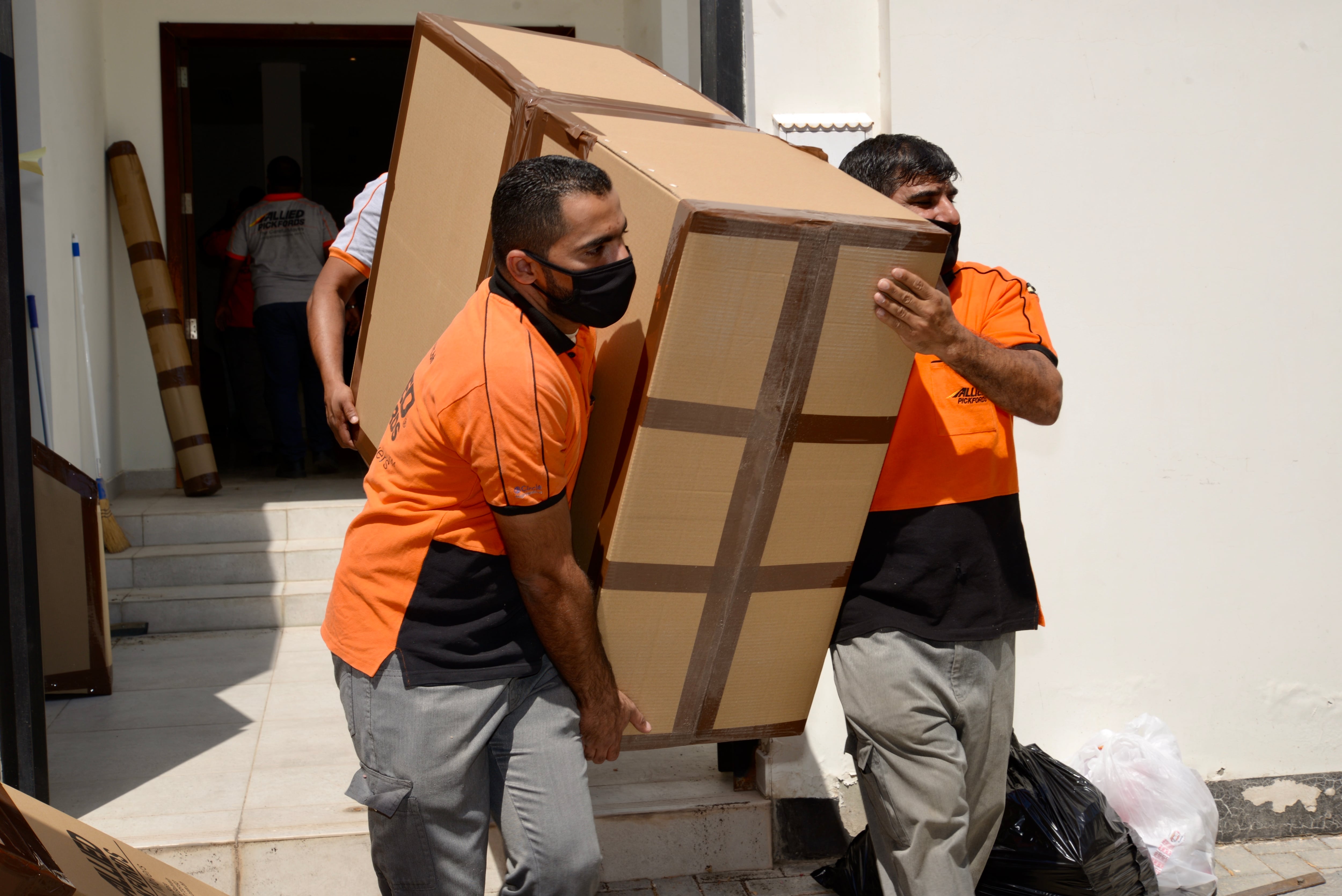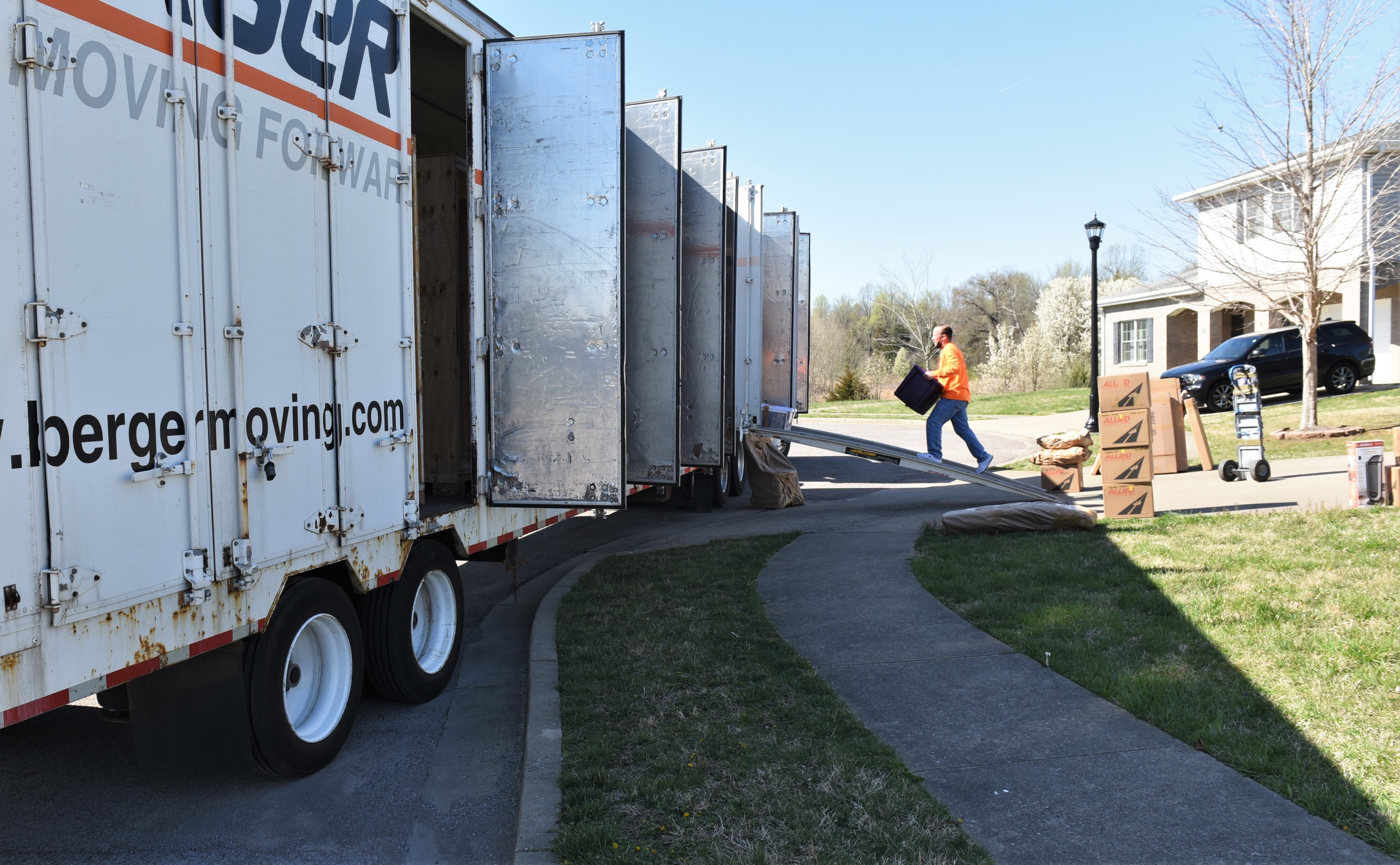The selection of a single company to arrange military moves worldwide will improve every part of the process for service members and their families, from scheduling the move to filing claims for loss and damage, said the CEO of the company that has just been awarded the $6.2 billion contract.
“We’ve looked at the entire end-to-end process very carefully, many times, from a service member’s perspective,” said Alan Thompson, CEO of HomeSafe Alliance, in an interview with Military Times. “We’re delivering improvement in every link in that process.” For example, technology such as smart phone apps will allow the company to be more responsive, communicating with service members in “near-real time,” he said.
This year, a number of service members have complained about not being able to get their moves scheduled, and those moving from overseas, especially, have complained about delays in delivering their household goods, which has cost families money. Persistent issues of capacity, including a shortage of truck drivers, were exacerbated by the pandemic. There have been supply chain issues, labor shortages, and other problems.
But problems have plagued some service members’ moves for decades. Defense officials launched a “re-engineered” move process in 2009, moving virtually all troops under the program by 2012. But seven years later, following a 2018 moving season fraught with loss, damage and delays for service members and their families, U.S. TRANSCOM announced plans for a global household goods contract.
As TRANSCOM officials have emphasized, this new contract won’t affect household goods moves overnight. Moves under the new program won’t take place until late 2022 at the earliest, given the nature of this contract, the likelihood of protests, and the time needed for a smooth transition. From now until then, most service members will move under the current program, in which more than 900 commercial companies move about 325,000 shipments a year at a cost of about $2.2 billion. Service members often have more than one shipment with their moves.
HomeSafe Alliance is a new, separate company developed and designed by KBR and Tier One Relocation specifically to support this contract, but it includes “significant subcontractors who are all industry-leading participants in the moving industry and moving technology,” said Thompson. He declined to name those companies because unsuccessful bidders may yet file protests to the award. And while he can’t be specific about the number of military moves those companies have made, he said it’s “substantial.”
He’s limited in what he can say about the details of the internal business model of Homesafe Alliance, he said, because he doesn’t want some of the information out in the public domain during a protest period.
Thompson, a retired vice admiral who was chief of the Navy Supply Corps, commander of Naval Supply Systems Command and director of the Defense Logistics Agency before he retired in 2012, was an executive at KBR before moving to HomeSafe. His second-in-command at HomeSafe is Matt Dolan, a retired Navy captain who has spent 17 years in the moving industry and has been the chief operating officer at Tier One Relocation.
“I wouldn’t be involved if I didn’t strongly believe this will be a dramatic improvement of the moving experience for members of the armed forces,” Thompson said.
“Our whole strategy is to reward the highest quality movers,” said Thompson. “They’re going to have a score card, and those that perform better, provide a better moving experience to the military service member, and meet the required pickup and delivery time frames, will get more work.”
U.S. Transportation Command will continue to conduct its independent customer satisfaction surveys.
RELATED

More movers for military families?
A big issue at the core of military move problems has been capacity — the ability to get enough qualified packers and loaders, trucks and drivers to do the work well and on time. The peak season for military moves is from May to August, and business drops off the rest of the year.
“To some extent that won’t change,” Thompson said. “But we’ll incentivize movers to have more trucks, drivers, packers. Quality is very, very important.”
He isn’t specific about those incentives. HomeSafe has worked to encourage companies to do military moves, he said, but those who have the highest quality will get the most business and they will guarantee they can provide HomeSafe’s required level of capacity.
The volume of work will be more predictable for companies, he said.
“The reality is we need the entire moving industry,” Thompson said. “Many elements, if not all, of the competitors will continue to be a part of this.”
More details are needed about how the contract will work, in terms of whether it will increase capacity, industry representatives said.
“We’re hopeful that quality capacity can grow under the [Global Household Goods Contract] concept,” said Dan Bradley, director of government and military relations for the International Association of Movers. “However, at this time we don’t have any real insight as to the details of how the GHC will be executed or what specific plans the GHC winning bidder will implement to grow capacity in the moving market.
“We are standing by, like most of the moving industry, to learn more as those details become available.”
HomeSafe has a strategy for a “relentless ongoing campaign” to increase the number of companies in the military moving arena, Thompson said. To a degree, with the new contract HomeSafe will be able to make some changes in rules that will attract more companies to the military moving arena, he said.
Another part of increasing capacity is making full use of the capacity out there now with “load and route optimization,” Thompson said. “U.S. TRANSCOM doesn’t have the same technology we do. TRANSCOM piece-meals PCS moves. No organization manages the entire picture.
“Now, there will be, and we’ve got the information technology to do it.”
What does ‘optimization’ mean for troops?
Thompson said a lot of moving vans currently driving along the nation’s interstates may be half full.
“With our load and route optimization capability, we think we’re going to fill up more trucks, which is good for us because it gets us more capacity,” he said. “There’s a lot of unused capacity out there today, so we’re going to leverage more capacity that exists. It’s also great for the small business local mover because, instead of driving trucks that are half full, we’re going to be driving a lot more trucks with military moves that are full.”
HomeSafe’s technology and visibility over all DoD moves globally is expected to bring advantages in many areas of the country, such as areas with large concentrations of military personnel. For example, one military family moving from Norfolk to San Diego in early June might fill up half a truck with their household goods. Another family living 10 miles away, moving at the same time to San Diego, might also require only half a truck. The way the system currently works, these moves are awarded separately, often with separate companies. During a moving season like the one in 2021, that second family might not be able to get a move scheduled for weeks because of the shortage of trucks.
Under the new contract, one trucking company might be awarded both those moves — which helps the families as well as the trucker.
Under the contract, HomeSafe will deal directly with the more than 2,000 individual companies that do the work — those with packers and loaders, trucks and drivers, and/or storage facilities, Thompson said. That’s a change from the current system, where contracts are awarded individually to companies known as transportation service providers. TSPs may or may not have workers and equipment to actually do the work, and act essentially as a middleman. Many of those companies that do the actual work of moving are small businesses.
An industry source said all the bidders on the contract proposed dealing only with companies that actually do the work.
“We’re convinced that particularly the small moving agents will be better off,” Thompson said. In addition, HomeSafe intends to provide these companies with information technology “they can use to run their business more efficiently and effectively,” he said. In the moving industry, many small companies can’t afford the technology that HomeSafe will provide, he said.
The $6.2 billion contract spans more than three years, with the transition and base period beginning Dec. 1 and ending Aug. 31, 2025.
This is the third time the Global Household Goods Contract has been awarded. It was originally awarded to American Roll-On Roll-Off Carrier Group Inc. on April 30, 2020, at a cost of $7.2 billion for about the same base period, with a potential payout of nearly $20 billion over nine years.
Following protests from two unsuccessful bidders — including HomeSafe Alliance — the government took corrective action and then re-awarded the contract to ARC on June 29, 2020. That award was also protested by the two bidders, and the Government Accountability Office found in favor of the protesters. TRANSCOM issued a new solicitation in November 2020.
Karen has covered military families, quality of life and consumer issues for Military Times for more than 30 years, and is co-author of a chapter on media coverage of military families in the book "A Battle Plan for Supporting Military Families." She previously worked for newspapers in Guam, Norfolk, Jacksonville, Fla., and Athens, Ga.





